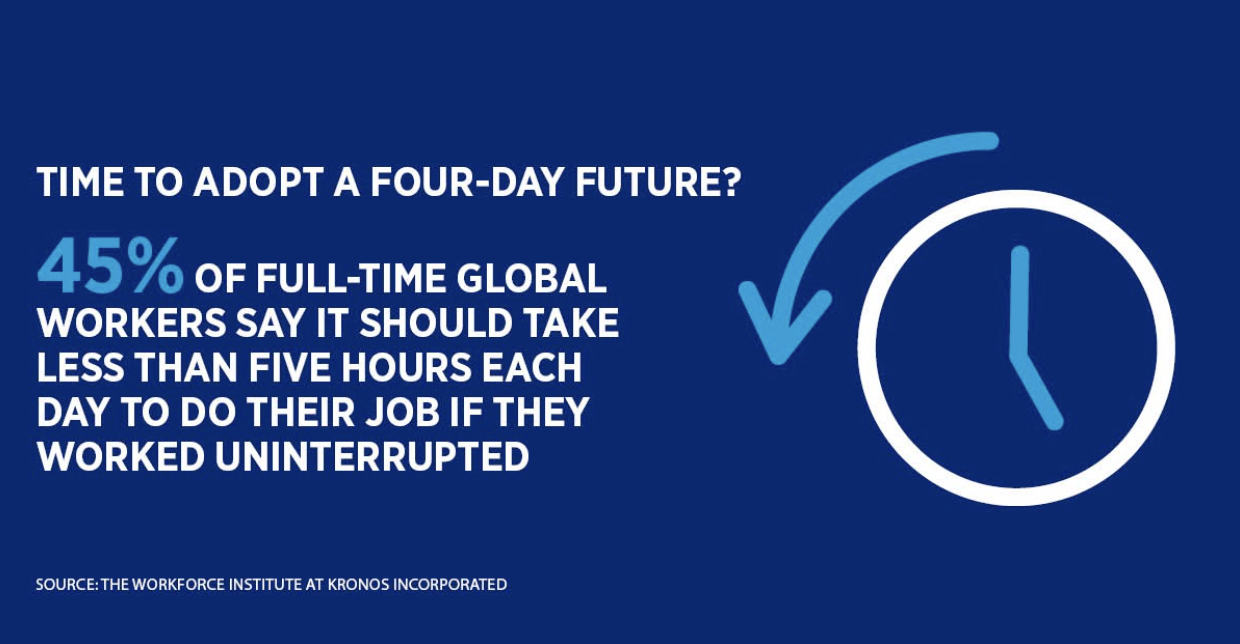Should companies adopt a 4-day work week?
Should companies adopt a 4-day work week?
일자
상시
유형
아티클태그
We all know that a healthy work-life balance is becoming a higher and higher priority in any workplace. Companies are staying competitive with generous employee benefits with more days off and flexible hours, but how much is too much before it affects work ethics in the workplace?
Microsoft Japan made headlines with their experiment in 2019, by giving their staff every Friday off as a special paid-leave to give the four-day work week a try. They found that their productivity went up by a whopping 40% with 92% of their 2,300 participating employees saying they preferred the new work schedule. On top of that, Microsoft Japan saw a decrease in overheads, reported using 23% less electricity and 59% less paper during the experiment.
With costs lowered and both productivity and employee satisfaction hiking up, should we all be considering adopting shorter work weeks? Yes and no.
First and foremost, it really depends on your business as all businesses are unique. If you are a service provider that runs in shifts then cutting the work week short for your employees will likely be counter-intuitive. You may need to hire more people to cover the same amount of time, subsequently raising overheads.
Microsoft Japan made headlines with their experiment in 2019, by giving their staff every Friday off as a special paid-leave to give the four-day work week a try. They found that their productivity went up by a whopping 40% with 92% of their 2,300 participating employees saying they preferred the new work schedule. On top of that, Microsoft Japan saw a decrease in overheads, reported using 23% less electricity and 59% less paper during the experiment.
With costs lowered and both productivity and employee satisfaction hiking up, should we all be considering adopting shorter work weeks? Yes and no.
First and foremost, it really depends on your business as all businesses are unique. If you are a service provider that runs in shifts then cutting the work week short for your employees will likely be counter-intuitive. You may need to hire more people to cover the same amount of time, subsequently raising overheads.
Experimenting with the 4-day Work Week

Having said that, Shake Shack experimented the four-day work week since March 2019 and Uniqlo too, joining on the trend since 2015 with great success (Link). Uniqlo’s premise is that employees will still have to put in 40 hours per week but across four-days instead of five - which the staff still preferred. For many young parents this meant saving one-fifth a week on child care costs while gaining an extra day at home.
Another software company, Basecamp, offers 32-hour, four-day workweeks for four summer months a year. “Thirty-two hours forces us to prioritize...it’s not about working faster, but rather working smarter” says Chase Clemons, Basecamp’s customer support team lead.
The Truth about Work Hours

In the U.S., a 2017 Stanford University study found the average worker was willing to give up 20% of their pay to avoid their work schedule changing at a short notice, and 8% of their pay in exchange for the option to work from home. 45% of full-time workers around the globe admits that it only takes them 5 hours each day to complete their job if they stayed focused.
What these case studies have demonstrated is that each business is unique and should not be concluded by industry - but there are definitely more successful cases than not. It is important to know your operational numbers before you jump into the bandwagon. Understand your employees’ needs and preferences. Most importantly, do not lose sight of the bigger picture, which is to increase staff wellbeing without sacrificing performance and results.
Where to Start?
Start by talking to your team
Start by carefully customizing a strategy that suits the numbers to your business. Conduct conversations with your employees to understand their needs and struggles. Would they rather squeeze in longer hours into shorter weeks or take a small pay cut for longer weekends? Find out as much as you possibly can and draw up a few scenarios to experiment with; unless it is an unanimous consensus then off you go!
Be transparent
Be transparent with the team. Your team needs to be prepared to switch back to five-day work weeks if it doesn’t work out. They also have the right to know how decisions are being made, so share your findings as this is part of the experiment as a team. Start by level-setting as a team that everyone is expected to deliver at least the same, if not better results, as this would be an experiment towards a more concise and effective work schedule, and not to do “less work”.
Start by carefully customizing a strategy that suits the numbers to your business. Conduct conversations with your employees to understand their needs and struggles. Would they rather squeeze in longer hours into shorter weeks or take a small pay cut for longer weekends? Find out as much as you possibly can and draw up a few scenarios to experiment with; unless it is an unanimous consensus then off you go!
Be transparent
Be transparent with the team. Your team needs to be prepared to switch back to five-day work weeks if it doesn’t work out. They also have the right to know how decisions are being made, so share your findings as this is part of the experiment as a team. Start by level-setting as a team that everyone is expected to deliver at least the same, if not better results, as this would be an experiment towards a more concise and effective work schedule, and not to do “less work”.